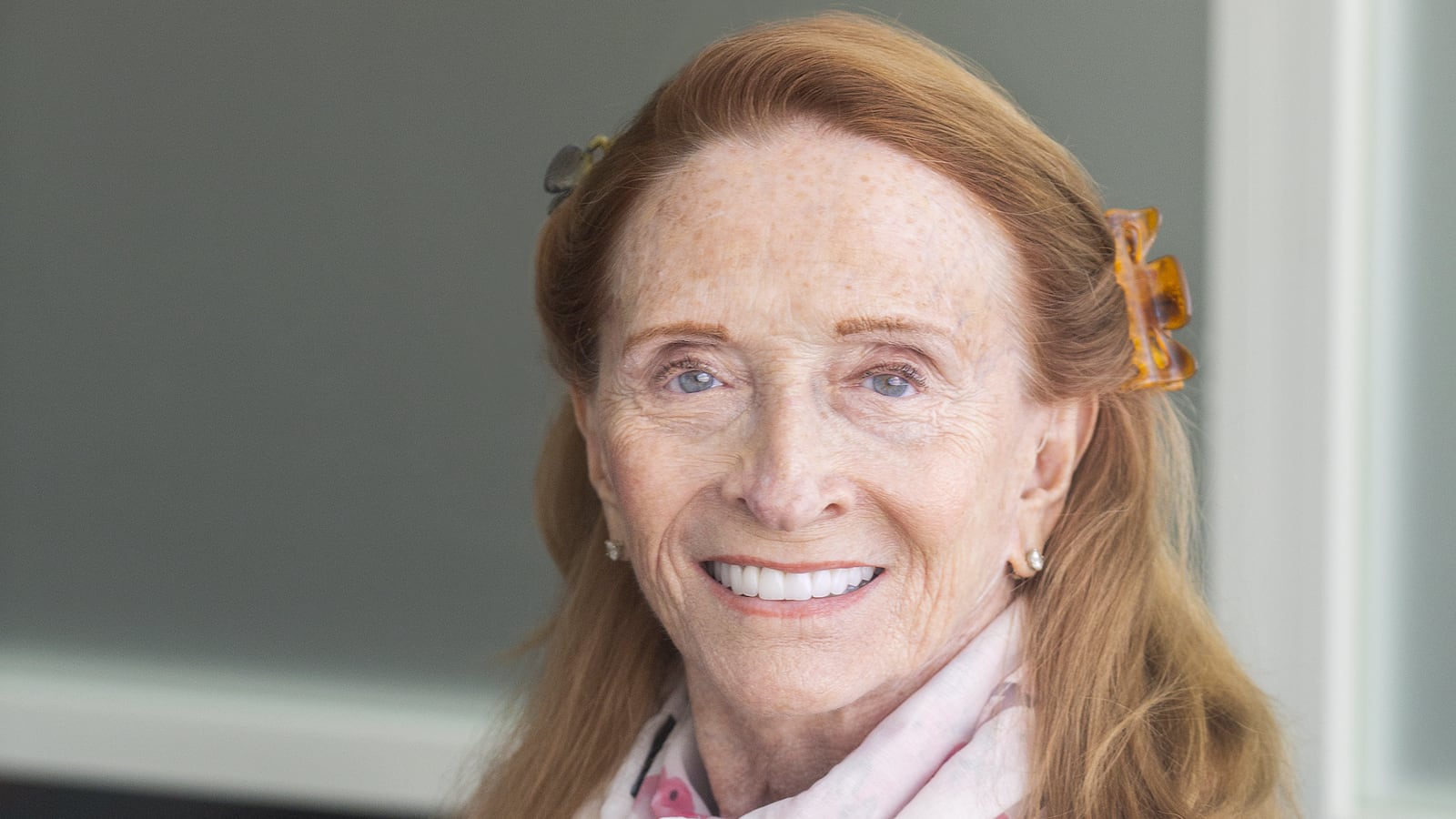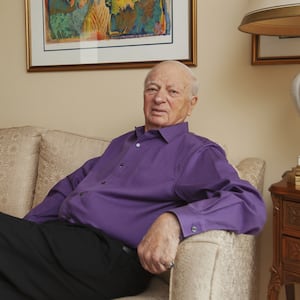Ginger Lane was at home with her mother in their Berlin apartment in the spring of 1943 when the Gestapo arrived. She doesn’t remember now, 80 years on, why exactly she hid behind a door as the two men led her mother—a Jewish woman born in Hungary—out of their home. But she does remember climbing onto a windowsill and looking down at the street below as the men put her mother, Lina Weber, into a black car, and drove away. It was the very last time Ginger saw her alive. She was 3 years old.
It wasn’t until early the following year that Ginger’s family were told, in a letter from the police, that Lina was dead. “They told us, of course, that it was influenza or something like that,” Ginger tells the Daily Beast. “But the family knew that she had been murdered.” Lina was killed in Auschwitz—the extermination camp built in Nazi-occupied Poland where around 1 million Jews were murdered by the Third Reich during the Holocaust.
Ginger, along with her six older siblings— Alfons, Senta, Ruth, Gertrude, Renee, and Judith—were also listed on a manifest to be deported to Auschwitz. “I don’t know where the document came from or how we learned, or how my father [Alexander Weber] learned that we were supposed to be on the next transport,” Ginger says. “All I do know is that Arthur Schmidt, I believe, told my father that we were scheduled to follow the next week. So he absolutely had to get us out of there.”
Arthur and his wife Paula Schmidt were Christian neighbors of Ginger’s family. “They weren’t complete strangers, but they weren’t close intimate friends,” Ginger says. Nevertheless, the couple offered to allow the seven children to hide at a fruit orchard the Schmidts owned around 40 miles away from Berlin. This act of monumental kindness and courage, which allowed the children to avoid capture until the end of the Second World War, is something which Ginger has never forgotten. “I’m constantly thinking about and reminded of the goodness of people who were all putting themselves at risk to try to help others during a very difficult time,” she says.
Now 83, Ginger is taking part in a campaign to preserve the stories of the Holocaust this Holocaust Remembrance Day (April 18). The Conference on Jewish Material Claims Against Germany’s campaign, Our Holocaust Story: A Pledge to Remember, records the experiences of people like Ginger in the hope that future generations might learn from the atrocities of the past.
It is only through her neighbors’ incalculable generosity that Ginger is still alive to tell her story. Looking back now, she can still recall the difficult days on the orchard in the quiet village of Worin which saved her life. “I have memories of being out on the farm being very lonely and digging in the field for potatoes and whatever fruit was available,” she says. “Always being hungry, and always being very much alone. I didn’t have anybody to play with. We had lived in a laundry shed that was on the property and were left pretty much to our own devices.”
Even then, they were in danger. “They were hidden in plain sight,” Ginger’s daughter, Beth, tells The Daily Beast. “But there were times when the Gestapo would come to the farm and do a search. They’d have to be hidden.” The family would later learn that the village’s mayor—himself a member of the Nazi Party—and other residents knew the children’s true identity, but never turned them in.

The Weber children in Bremerhaven, Germany. Ginger stands on the right end of the line.
HandoutAs the children hid, their father, Alexander, remained in Berlin. He had been raised Catholic but converted to Judaism to marry the children’s mother. But he too knew first hand the horrors of Nazi concentration camps, having spent time imprisoned in Oranienburg in Prussia as a political dissident in 1933. “He was there for 10 months before he was released,” Ginger says, “And according to my brother Alfons, he was pretty much a broken man after that time.” As the children hid, Alexander arranged for them to be baptized in the hope it would make them safer. Beth believes part of the reason the children may have survived as long as they did is because the Nazis classed them as Mischling—or “mixed blood”—on account of their dual parentage.
After almost two years hiding in Worin, the children returned to Berlin in the back of Schmidt’s truck just two weeks before the end of the war as Soviet forces advanced on the German capital. There, Ginger witnessed the brutal street-by-street fighting that eventually led to Hitler’s downfall—and was once again saved by her neighbor, Arthur Schmidt.
“There was an air raid and our building was bombed and we wound up… We’d hidden in the shelter in our basement,” Ginger says. “With all the rubble, we couldn’t get out. And he actually dug us out. So he saved us again. He was just this very kind man.”
When the bombing stopped and Nazi Germany surrendered, the family faced an uncertain future. They moved from one displaced persons camp to the next until they were finally able to secure passage to America. But there was a catch—although their father was still alive, the kids would have to declare themselves orphans in order to be given refuge in the U.S. Ginger says she wasn’t concerned at the time about the prospect of leaving Germany without her father. “Don’t worry,” Ginger says he told her, “I’m coming in two weeks.” The children arrived in New York aboard the SS Marine Flasher in May, 1946. Alexander would not reach America for another ten years.
As the only known example of seven Jewish siblings to have survived the holocaust and emigrated to America together, the Weber children were the subject of immediate attention from the press upon their arrival. But the remarkable size of their family posed a problem: they would have to split up. “Because what foster parents were going to be able to take in seven children?” Ginger says.

Ginger (front right) with her siblings after their arrival in New York Harbor on May 21, 1946. This image is displayed in the United States Holocaust Memorial Museum.
HandoutEach of the siblings were sent to different Jewish foster families in Chicago, where Ginger still lives today. It was then that Ginger, who was born Bela Weber, took her new name. She was ultimately adopted by a neurosurgeon and his wife, who had been a singer. As well as being with a new family, Ginger also lost contact with her biological siblings. “It doesn’t happen today,” Ginger says, “But at that time the thinking was that this would be best for all the children—to separate them to move forward with their lives.”
As the years passed, Ginger only had fleeting contact with her members of her birth family. Once, while out to dinner with her adoptive family in Chicago, she walked by another family on the sidewalk. “As we passed each other on the street, I turned back to look at the man at the same time that he turned back to look at me,” Ginger says. “There was some sort of instant recognition, although we did not speak. It was my father and his new family.” She never reconnected with her biological father.
After suffering a spinal cord injury while skiing in the 1980s, Ginger was spurred to get in touch with her siblings. Forty years after arriving together in New York, the Weber children were together again in 1986. “One by one, I reconnected with everybody, and then we had a big family reunion,” Ginger said. “And all of my children and my husband of course were involved. And so it’s moved forward since then. We’ve always had contact since then.” One of her sisters told Ginger: “You’ve come out of the wilderness, just like Moses.”
Another milestone came in 2017 when Ginger and her family traveled to Germany. It was the first time Ginger revisited the orchard. Mere weeks after arriving back in the U.S., she was horrified to watch on TV as white supremacists marched through Charlottesville carrying torches, chanting “Jews will not replace us.” The experience of revisiting the place where she hid during the Holocaust coupled with open antisemitism in the country she calls home motivated her to start sharing her story. “I felt a deep connection for having to speak out, and to acknowledge that this happened to me, not just to Jews out there,” Ginger says. “That I was part of that generation.”
The experience also left a lasting impression on Ginger’s daughter Beth, an actress, who vowed during the trip to Germany that she would record her ancestors’ story. She’s made her directorial debut with a film, Would You Hide Me?, which chronicles her family’s tale of survival. The movie, which is yet to be released, will be the first project of a new non-profit, The Weber Family Arts Foundation, which will “promote stories of hope in service of combating antisemitism, bigotry and hate.” “I think that what we have to do is be upstanders and not bystanders,” Beth, now based in California, says. “And not just regarding Judaism, but anybody who is being persecuted. Any kind of genocide.” She adds: “I just don’t understand how Ukraine can be happening today.”
It will not be long before the Holocaust passes from living memory. “If we don’t tell these stories, we’re dying,” Ginger says. “Our generation is dying. And if not now, when?”







